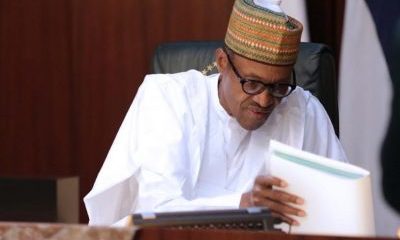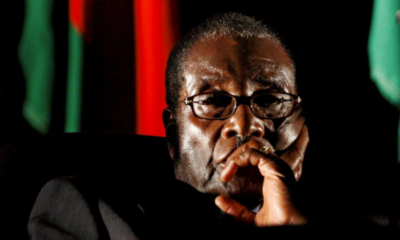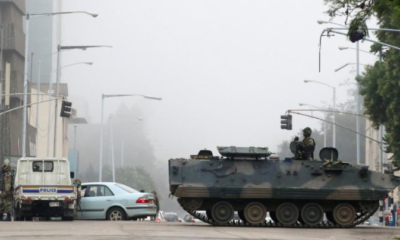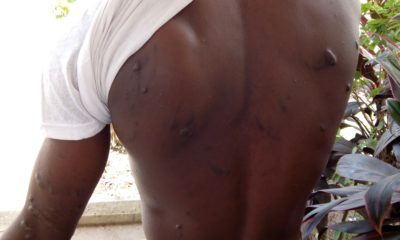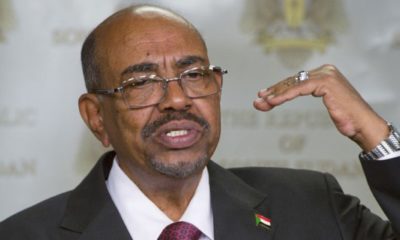Nigerian Newspapers
U.S. Report: No fewer than 6,000 kids languish in prisons
The United States’ Department of State, in its just-released Country Reports on Human Rights Practices for 2012, indicted the Federal Government for poor handling of the prisons. It says there are prisoners with mental disabilities incarcerated with the general prison population and no less than 6,000 children in prisons across the country, among many other human rights abuses. Excerpts:
Prison and detention center conditions remained harsh and life threatening. Prisoners, a majority of whom had not been tried, were subject to gross overcrowding, food shortages, inadequate medical treatment, and infrastructure deficiencies that led to wholly inadequate sanitary conditions. Reports indicated guards and prison officials threatened inmates with extortion or levied fees on them to pay for the maintenance of the prison and subjected them to physical abuse; in some cases female inmates faced the threat of rape. Female prisoners pregnant at the time of incarceration gave birth to and raised their babies in prison.
Domestic and international human rights groups reported the existence of unofficial military prisons, including the Giwa military barracks in Maiduguri, Borno State. HRW and AI cataloged cases of illegal detention, inhumane and degrading treatment, beatings, torture, and extrajudicial killings in these prisons. AI estimated 200 to 500 people were detained at the Giwa barracks. Those interviewed for the reports claimed families and lawyers did not have access to suspects detained in these facilities, and authorities moved detainees frequently and without notice, making it difficult for families or lawyers to locate a detainee. The government claimed Giwa barracks was only used as a military barracks, and did not serve as a detention center. Boko Haram suspects were reportedly held in inhuman conditions at the Special-Anti-Robbery Squad (SARS) detention center, also known as the “abattoir,” in Abuja. On November 26, suspected Boko Haram militants attacked the SARS detention center, freeing an estimated 30 detainees, possibly including Boko Haram members.
Physical Conditions
The prison system included 12 maximum-security prisons, 83 satellite prisons, 10 farm centers, two women’s prisons, eight zonal offices, and six directorates, all of which held prisoners and detainees. The Nigerian Prison Service released statistics at the end of March indicating the prisons held 50,920 inmates. Of that inmate population, slightly less than 2 percent were females and 1 percent juveniles.
Overcrowding was a problem. Although national capacity stood at 47,284, an imbalance in the use of prisons resulted in underutilisation at some facilities—some newer prisons had no inmates—while others were at 600 percent of their designed capacity. The Owerri Federal Prison had a capacity of 548 prisoners but held more than 1,784. Ogwuashi-Uku prison in Delta State, with a capacity of 64 prisoners, housed 541, while Port Harcourt prison, with a capacity of 804 prisoners, held 2,955. Ijebi-Ode prison in Lagos, with a capacity of 49 prisoners, held 309.
Most of the country’s 234 prisons, built 70 to 80 years earlier, lacked basic facilities. Lack of potable water, inadequate sewage facilities, and severe overcrowding resulted in dangerous and unsanitary conditions. Disease remained pervasive in cramped, poorly ventilated prison facilities, which had chronic shortages of medical supplies. Inadequate medical treatment caused many prisoners to die from treatable illnesses. Prison illnesses included HIV/AIDS, malaria, and tuberculosis. Inmates with these illnesses lived with the general prison population. Although authorities attempted to isolate persons with communicable diseases, facilities often lacked the space to do so. Prison authorities claimed the death rate in prisons was 89 out of 1,500 prisoners per year; no reliable independent statistics existed on the number of prison deaths.
During a June 22 visit to prisons in Enugu State and Owerri, Imo State, an observer noted cells designed for 20 inmates held 80, authorities conducted no routine screening for tuberculosis, other infectious diseases, or pregnancy, and they had not established isolation wards, adequately equipped clinic facilities, or proper sewage disposal systems.
Only those prisoners with money, or whose relatives brought food regularly, had sufficient food; prison officials routinely stole money provided for food for prisoners. Poor inmates often relied on handouts from others to survive. Prison officials, police, and other security force personnel often denied inmates food and medical treatment as punishment or to extort money.
Prisoners with mental disabilities remained incarcerated with the general prison population. Individual prisons made efforts to provide mental health facilities, but most prisons did not provide mental health care.
The Federal Government operated all the prisons but maintained few pretrial jail facilities. Of the total prison population, 72 percent were pretrial detainees.
Authorities sometimes held female and male prisoners together, especially in rural areas, and prisons had no facilities to care for pregnant women or nursing mothers. Infants born to inmate mothers usually remained with the mother until weaned. Juvenile suspects were often held together with adult prisoners.
Although the law precludes the imprisonment of children, minors, many of whom were born there, lived in the prisons. A report by the African Union on the rights and welfare of the Nigerian child found an estimated 6,000 children lived in prisons and detention centers. Despite a government order to identify and release such children and their mothers, authorities had not done so by year’s end. Authorities held political prisoners with the general prison population.
Administration
Prison authorities allowed visitors within a scheduled timeframe. However, few visitors came due to lack of family resources and travel distance. Prisoners could attend religious observances, although prisons often did not have equal facilities for Muslim and Christian worship. In some prisons outside clergy constructed chapels or mosques.
The country does not have an ombudsman to serve on behalf of convicted prisoners and detainees in considering such matters as alternatives to incarceration for nonviolent offenders to alleviate overcrowding; the status and circumstances of confinement of juvenile offenders; or improving pretrial detention, bail, or recordkeeping procedures to ensure prisoners do not serve beyond the maximum sentence for the charged offence.
Prisoner complaints centered on lack of access to court proceedings, as in many cases inmates lacked transportation to attend a court hearing. All prisons suffered from poor facilities and lack of resources.
Monitoring
The National Human Rights Commission (NHRC) monitored prisons throughout the year. The commission compiles an annual prison audit but the report for 2012 was not available by year’s end. The Federal Ministry of Justice was also known to monitor prisons under the Federal Government Prison Decongestion Program. However, there were no regular outside monitors of the prisons, and no statistics on the mistreatment of prisoners or availability of food or medical care.
The government provided access to prisons for monitoring conditions, although few outside visits occurred. The local Red Cross made attempts to visit prisons but could not maintain a regular visit schedule. Authorities inconsistently maintained records for individual prisoners in paper form but without making them widely accessible.
Improvements
The government did not make widespread improvements to prisons during the year, but individual prison administrations attempted to collect donations from religious organizations, NGOs, and the National Youth Service Corps to benefit inmates. For example, on April 27, Junior Chamber International Nigeria renovated and donated a five-room housing unit to the Akwa Ibom prison. On May 13, the youth service corps donated a psychology clinic for the rehabilitation and counseling of inmates at the Onitsha prison.
Arbitrary arrest
or detention
The constitution and law prohibit arbitrary arrest and detention; however, police and security forces continued to employ these practices. The JTF arbitrarily arrested hundreds of persons during sweeps for militants, and security force personnel made arbitrary arrests during the national elections.
The NPF reports to the inspector general of police, who is appointed by the president and responsible for law enforcement operations. An assistant inspector general commanded each NPF state unit. The constitution prohibits state and local governments from organizing their own police forces; however, state governors may direct federal police for local emergency actions. The SSS remains responsible for internal security and reports to the president through the national security advisor. Due to the police’s inability to control societal violence, the government continued to turn to the army in many cases. For example, throughout the year President Jonathan ordered the deployment of military, JTF, or Special Task Force units to Bauchi, Borno, Kano, Kaduna, Plateau, and Yobe states on a continuous basis in response to Boko Haram attacks and after local police could not contain outbreaks of ethnoreligious violence in Jos and Kaduna.
The NPF, SSS, and military reported to civilian authorities; however, these security services periodically acted outside of civilian control. The government lacked effective mechanisms to investigate and punish abuse and corruption. The NPF remained susceptible to corruption, committed human rights abuses, and generally operated with impunity in the apprehension, illegal detention, and sometimes execution of criminal suspects. The SSS also committed human rights abuses, particularly in restricting freedom of speech and press. In some cases private citizens or the government brought charges against perpetrators of human rights abuses in these units. However, most cases lingered in court or went unresolved after an initial investigation.
According to AI’s 2009 report, only a fraction of the NPF annual budget reached state and local police stations, and the lack of funding contributed to many police failures. In May and July the new inspector general of police, Mohammed Abubakar, publicly attributed poor performance and corruption among police to a lack of government support for the personnel, inadequate funding, poor work environment, lack of incentives, and low morale. On August 7, widows of slain police officers protested outside police headquarters in Abuja over the nonpayment of benefits (see section 4).
Police routinely detained suspects without informing them of the charges or allowing access to counsel and family members. Provision of bail often remained arbitrary or subject to extrajudicial influence. Judges often set conditions of bail too stringent to be met. In many areas with no functioning bail system, suspects remained incarcerated indefinitely in investigative detention within the prison system. Authorities kept detainees incommunicado for long periods. Numerous detainees alleged police demanded bribes to take them to court to have their cases heard. If family members wanted to attend a trial, police often demanded additional payment.
Police held persons who happened to be in the vicinity of a crime for interrogation for periods ranging from a few hours to several months. After their release authorities frequently asked them to return for further questioning.
Security force personnel arbitrarily arrested numerous persons during the year. Human rights groups accused the government and security forces of arbitrarily arresting male inhabitants of Maiduguri or family members of suspected militants following Boko Haram attacks. The number of such cases remained unknown, but AI and HRW catalogued examples of such cases throughout the year.
————————————————————————————————————————-
Posted in Nigerian Newspapers. A DisNaija.Com network.
Source: The Nation Newspaper
DisNaija.Com publishes regular posts on Nigeria News, Nigerian Newspapers, Online Nigeria Gist.
Follow us on Twitter and Facebook.
Your Opinion Counts. Be sure To Leave A Comment, If You Have Any.
Please Like, Share or Tweet. Your Support Is Appreciated.
This Day
Military, Police Ring Abuja to Forestall Boko Haram Attack
•Deploy more personnel as army chief vows to wipe out terror group
•Security beefed up at N’Assembly
Deji Elumoye and Kingsley Nwezeh in Abuja
Abuja, Nigeria’s seat of power, is under a massive security cordon following threats of attacks by insurgents and the increasing wave of banditry in the contiguous states of Kaduna, Kogi, Nasarawa and Niger States, THISDAY’s investigation has revealed.
There has been a wave of kidnappings in the outskirts of the federal capital, notably Pegi, Tuganmaje and Kuje among others, which the police have battled in recent times.
The security situation in and around the Federal Capital Territory (FCT) was heightened by the pronouncement of the Niger State Governor, Mr. Sani Bello, that Boko Haram fighters who he said sacked 50 villages in the state and hoisted the terror group’s flag, were about two hours drive away from the FCT.
Security has also been beefed up at the National Assembly as operatives, yesterday, thoroughly screened every vehicle approaching the National Assembly complex in Abuja.
The deteriorating security situation nationwide prompted the National Chairman of the Peoples Democratic Party (PDP), Prince Uche Secondus, to warn that the 2023 general election may not hold, demanding the declaration of a state of emergency as well as the convocation of a national conference.
However, the Chief of Army Staff, Lt. Gen. Ibrahim Attahiru, yesterday restated the Nigerian Army’s determination to annihilate Boko Haram.
But the Governor of Katsina State, Hon. Bello Masari, cautioned against declaring a state of emergency, saying doing so isn’t the solution to combat the security challenges facing the country.
The security of the nation’s airports was also in focus yesterday as the Office of the National Security Adviser (ONSA) said there was no threat to them.
THISDAY’s investigations showed increased presence of troops, police, Nigerian Security and Civil Defence Corps (NSCDC) personnel and intelligence operatives at the three strategic entrances to the city notably, Keffi, Zuba and Gwagwalada.
More checkpoints were also mounted around Gwagwalada and Keffi.
THISDAY also observed increased intelligence deployment at the entrance and the borders of FCT with contiguous states.
Beyond the borders, there were more deployments and police patrols inside the city and increased intelligence deployments as well.
Security sources told THISDAY: “There are deployments here and there but they are routine. Alertness is key to a secure environment.”
It was also learnt that security agencies were involved in frenzied meetings throughout yesterday.
The meetings, coordinated by the office of the Chief of Defence Staff under the new joint operational strategy of the armed forces, were aimed at coordinating a joint response to possible threats of attack to the FCT.
“I understand the security teams have been meeting for some days now and if you look around you, you will notice that there are increasing patrols and numbers of security personnel. The threats are not been taken lightly,” a source said.
National Assembly workers, lawmakers and visitors also had a harrowing experience accessing the legislative complex due to heightened security in the area.
Security operatives thoroughly screened every vehicle approaching the National Assembly complex in Abuja, impeding both human and vehicular traffic.
The Sergeant-at-arm of the National Assembly and other security agencies supervised the operations, leading to huge traffic build-up inside the complex.
Legislative staff, visitors and lawmakers were seen patiently waiting for their cars to be searched so that they could go ahead with the business of the day.
Some staff and visitors at some point got tired of waiting and were seen alighting from their cars to trek from the gate to the complex.
Meanwhile, the ONSA has said there is no threat to the nation’s airports.
A statement by the Head of Strategic Communication, Mr. Zachari Usman, said the reports of threats to the airports were an internal correspondence of security threat assessment misconstrued as security threat to the airports.
PDP Demands State of Emergency
In a related development, the PDP National Chairman, Prince Uche Secondus, yesterday demanded the declaration of a state of emergency, warning that the 2023 general election might not hold if the federal government failed to tackle insecurity.
He called on the federal government to summon a national conference to address the spike in insecurity.
Secondus added that the national caucus of the party will meet today to discuss the state of the nation.
Addressing members of the National Executive Committee (NEC) in Abuja, Secondus said: “We are worried Abuja is not even safe. It is no longer politics. We got alert of plots to bomb and burn down our airports.
“We urge the federal government to declare a national state of emergency in security. There is the need to call a national conference to discuss the insecurity in the country.
“There may not be any election in 2023 in Nigeria due to insecurity. This government must listen to the people. The Buhari government should call a national confab to discuss security and state of the nation. It is no longer politics. This time we are not playing politics. Let’s keep politics aside and move the nation forward.”
He said the country had been grounded, regretting that there had been no matching response from the federal government.
Secondus said in the past, terrorism in the North was confined to the North-east, but with the report of Boko Haram occupying villages in Niger State, terrorism had spread to the North-central
“Herdsmen are also menacing in the West; gunmen causing havoc in the East; and the militants in the South; all killing, looting, raping, maiming and burning down homes. The situation is bad; Nigerians all over are living in fear,” he said.
The Senate Minority Leader, Senator Enyinnaya Abaribe, said the problem of Nigeria was outside of the PDP headquarters, while pledging the support of the Senate to the declaration of state of emergency in security.
Abaribe said he deliberately decided not to speak on the floor of the Senate but to allow the APC senators to speak so as to avoid being accused of giving a partisan colouration to the issue of insecurity.
He stated that only electoral reforms would give victory to the opposition party in the 2023 general election and ensure a democratic defeat of the APC-led federal government.
Also, the Minority Leader of the House of Representatives, Hon. Ndudi Elumelu, commended the NEC and the PDP leadership for their collective efforts at resolving the House leadership crisis.
The NEC meeting adopted the position of Secondus, calling on the federal government to convoke a national conference to discuss the state of insecurity in the country, according to a communiqué read by the National Publicity Secretary, Mr. Kola Ologbondiyan.
Army Chief Vows to Wipe Out Boko Haram
The army yesterday reiterated its commitment to wipe out Boko Haram.
Chief of Army Staff (COAS), Lt. Gen. Ibrahim Attahiru, told reporters in Maiduguri, Borno State that Boko Haram had been defeated in many encounters and would continue to be defeated until it’s annihilated from Nigeria.
“We will take on Boko Haram decisively, and we are committed to the focus of the operations, which is the total annihilation of Boko Haram from Nigeria,” he said.
The COAS, who was visiting the headquarters of Operation Lafiya Dole in Maiduguri for the fifth time since his appointment four months ago, said the visit was to boost the morale of the troops, reassure them and listen to any issues affecting them.
Earlier, the Theatre Commander of Operation Lafiya Dole, Maj. Gen. Farouq Yahaya, lauded the visit, which he said had continued to boost the morale of the troops.
“We are honoured, we are grateful, we are encouraged by those visits. You provided us guidance, logistics and other things we required. We are most grateful for those visits,” Yahaya said.
State of Emergency Won’t Solve Security Challenges, Says Masari
Katsina State Governor, Hon. Aminu Masari, has, however, said declaration of a state of emergency won’t solve the security challenges facing the nation.
Masari, who spoke yesterday with journalists after meeting with the Chief of Staff to the President, Prof. Ibrahim Gambari at the State House, Abuja stated that he was against the recent call by the House of Representatives for the declaration of a state of emergency in the security sector as it would not solve the problem.
According to him, declaring a state of emergency will not achieve the desired effect as the security structure and personnel to be used to execute the emergency are already overstretched in a bid to safeguard lives and property.
Sourced From: THISDAYLIVE
Tribune
Nigeria records 55 new COVID-19 infections, total now 165,110
Tribune Online
Nigeria records 55 new COVID-19 infections, total now 165,110
The Nigeria Centre for Disease Control (NCDC) has recorded 62 new cases of COVID-19, bringing the total number of infections in the country to 165,110. The NCDC disclosed this on its official Twitter handle on Friday. “55 new cases of #COVID19Nigeria; Lagos-21, Yobe-19, Ogun-6, Akwa Ibom-3, Kaduna-2, Plateau-2, FCT-1, Rivers-1.” YOU SHOULD NOT MISS THESE HEADLINES FROM NIGERIAN TRIBUNE COVID-19: Nigeria Recorded […]
Nigeria records 55 new COVID-19 infections, total now 165,110
Tribune Online
Sourced From: Tribune Online
Vanguard
Attacks on S’East: We must explore all options of negotiation — Stakeholders urge Igbo

By Olasunkanmi Akoni
The people of the South East region have been urged to explore the power of negotiation and mutual settlement in the face of ongoing killings and security challenges in the zone because the east can not afford another war at present.
Stakeholders from the South-East geo-political zone made the remark on Thursday, at the unveiling of the book, “Igbo, 50 years after Biafra,” written by Special Adviser to Lagos State Governor Babajide Sanwo-Olu on Drainage Services, Joe Igbokwe, held at Ikeja G.R.A.
Speaking at the unveiling of the book, the chairman of the occasion, Mr. Cutis Adigba,
urged the people of the South-East to learn to build bridges across the country, so that they can realise their ambition of producing the next president of Nigeria.
Adigba urged leaders from the zone to discourage the move and agitation by some youths in the South East to go to war and secede out of Nigeria.
Also read: Banditry: Disregard viral video, Niger State gov’t urges residents
He said that Igbo have always found it difficult to rule Nigeria because they refused to build bridges across the six geo-political zones that made up Nigeria.
While describing the agitation as uncalled for, Adigba noted that after two decades that Nigeria returned to civil rule, the Igbo has predominantly identified with only one political party.
He maintained that remaining in one party can not advance the cause of the people of South East and cannot make them realise their objective of producing an Igbo man as president.
He maintained that the publisher of the book, Igbokwe played politics outside his state, so that the Igbo race can be integrated with one another race.
Adigba said the failure of the Igbo to reintegrate with other ethnic nationalities politically was responsible for the retrogression of the race in Nigerian politics.
Igbokwe, also addressing guests on the occasion, maintained that the Igbo are not advancing politically because they refused to be integrated into National politics, lamenting that, despite their success in business, they are not successful in playing politics at the national level.
Corroborating Dimgba, Igbokwe noted that there was the need for the Igbo people to stand up and build bridges so that their objective of producing the next president of Nigeria could be realised.
According to him: “I have decided to raise my voice, I hope my people will hear me while trying to quell the effect of the war, our people are spoiling for another war, mayhem is being unleashed in Igbo land, and there is palpable fear.
“Those who could speak have lost their voice, mindful of the consequences of their actions, I am calling on all Igbo leaders to speak up because all actions carry consequences, consequences of the silence will be too dastardly to sustain.
“Those silently supporting the wild wind should be careful or else they hand over to their children,” he said.
Igbokwe urged those spoiling for war to jettison their plan and embrace dialogue, urging them to learn from the South West region that despite the challenges faced after the annulment of the June 12, 1993, election, they did not go to war, and the region had the opportunity of producing two of her sons for presidential position in 1999.
“You have to build bridges to become president of Nigeria, but it is unfortunate the Igbo are burning bridges.”
Speaking at the event, Chief Uche Dimgba who is the coordinator of Igbo in All Progressives Congress, APC in Lagos, described Igbokwe as “a Frank, fearless and reliable leader, who based his views on issues and stand by his opinions, and we the Igbo have confidence in him and believe he can lead us aright.”
“He is a leader we Igbo believe in and we will follow him. If he can serve all the governors produced in Lagos State since 1999, he is a better man to follow because he possesses all the experience that can be of benefit to Igbo both at home and in the diaspora.”
The post Attacks on S’East: We must explore all options of negotiation — Stakeholders urge Igbo appeared first on Vanguard News.
Sourced From: Vanguard News
Premium Times
Insecurity: Lagos bans occupation of abandoned buildings
The government said that no worker should stay back beyond 6:00 p.m. within premises of buildings undergoing construction.
The post Insecurity: Lagos bans occupation of abandoned buildings appeared first on Premium Times Nigeria.
Sourced From: Premium Times Nigeria

